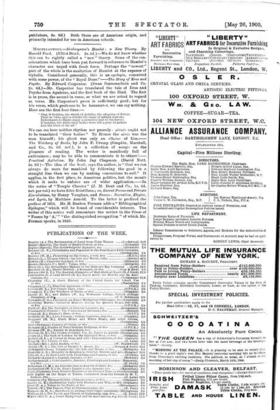MISCELLANROUS.—Shakespeare's Hamlet : a New Theory. By Harold Ford. (Elliot
Stock. 2s. Cd.)—We do not know whether this can he rightly called a "new" theory. Some of the con- siderations which have been put forward in reference to Hamlet's character are urged with fresh force. Perhaps the "newest" part of the whole is the exaltation of Hamlet at the expense of Ophelia. Considered generally, this is an apologia, conceived with some power, of the "Royal Dane."—The Story of Eros and Psyche. By Edward Carpenter. (Swan Sonnenschein and Co. 2s. 6d.)—Mr. Carpenter has translated the tale of Eros and Psyche from Apuleius, and the first book of the Iliad. The first is in prose, the second in verse, or what we are asked to regard as verse. Mr. Carpenter's prose is sufficiently good; but for his verse, which professes to be hexameter, we can say nothing. Here are the first four lines :— " Sing, 0 Goddess, the wrath of Achilles, the offspring of Peleus, Fatal as 'twas, and to Greeks the cause of infinite sorrows. Downwards to Hades many a dauntless soul of the heroes It hurried, the while their bodies Were left a prey to jackals And the birds of the air."
We can see here neither rhythm nor prosody: WiTOLT ought not to be translated "their bodies." To Homer the ainifs was the man himself; his ghost was only an Moto:, of him.— The Wstchery of Books, by John F. Cramp (Simpkin, Marshall, and Co., 3s. 6d. net.), is a collection of essays on the pleasure of reading. The writer is manifestly full of enthusiasm ; may he be able to communicate it to others !— Practical Agitation. By John Jay Chapman. (David Nutt. Be. 6d )—The idea of the book, says the author, is "that we can always do more for mankind by following the good in a straight line than we can by making concessions to evil." It applies, in the first place, to American politics, but the morals which it seeks to enforce are of wider application.—In the series of "Temple Classics" (J. M. Dent and Co., Is. 6d. net. per vol.) we have Sites Scintillans ; or, Sacred Poems and Private Ejaculations, by Henry Vaughan, and Poems : Narrative, Elegiac, and Lyric, by Matthew Arnold. To the latter is prefixed the preface of 1854. Mr. H. Buxton Forman adds a" Bibliographical Epilogue," which will be found of considerable interest. The writer of this notice well remembers the review in the Times of "Poems by 'A,'" "the distinguished recognition " of which Mr. Forman speaks, in 1849.






































 Previous page
Previous page